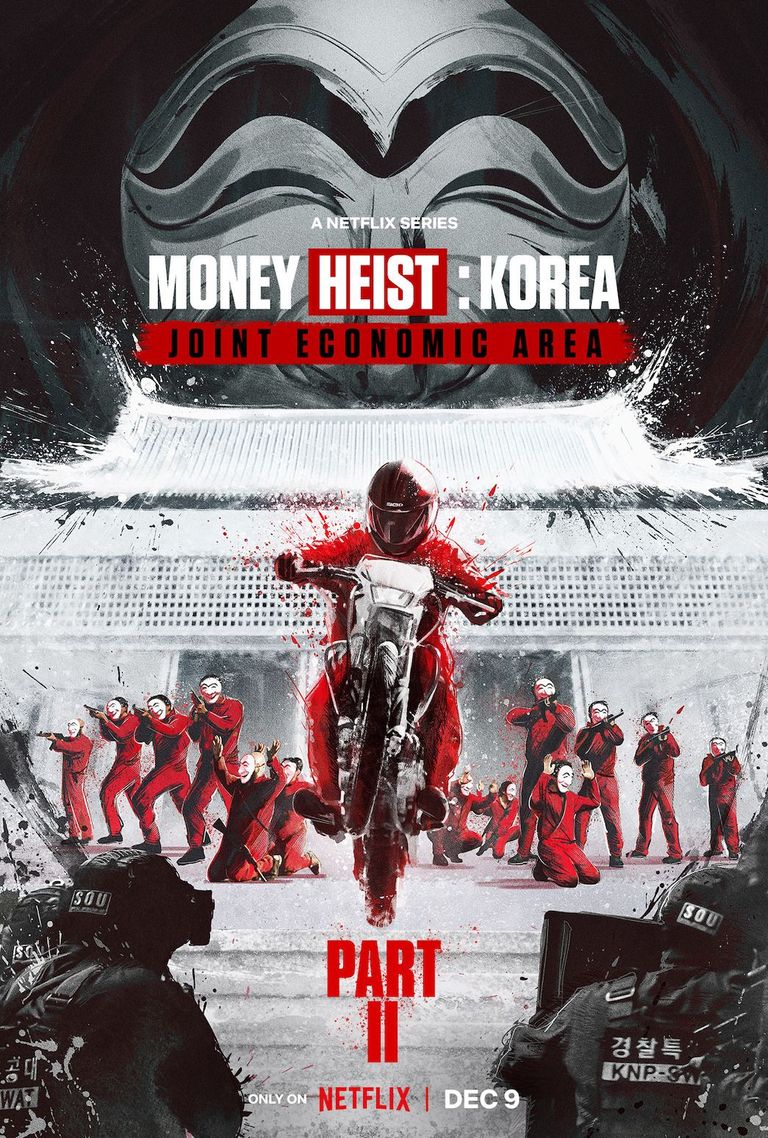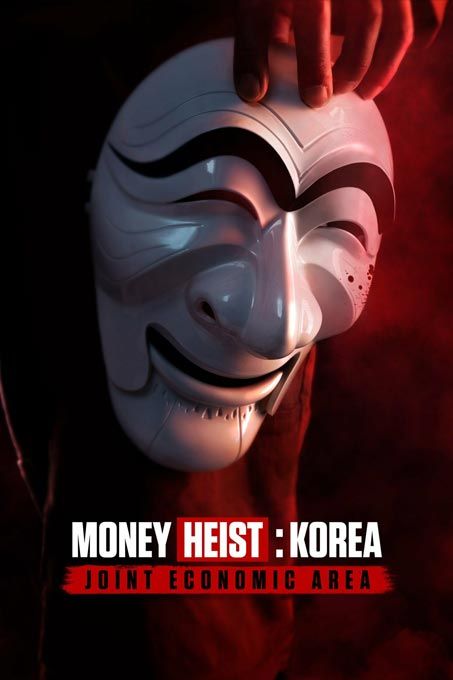
In the previous text, I wrote why I think that the Korean version is better than the Spanish version in almost every way. Today, after watching the second half, I have not changed my mind (well, except for one aspect - in terms of music, the Spanish version is better). In fact, I have nothing to add to that text - if I slightly expanded it with things about the last 6 episodes, I could copy it 1: 1. The Korean version has fewer errors, the script is better written. I would also say that it has more interesting characters and better actors, but in this matter, the difference is so slight that I can ignore it. What I can't ignore is the character of the Professor. This one is the same as the original, but better - more consistent and uniform. On the other hand, it also adds realism to him - most people can't calculate so "coldly" and are more handicapped than the original Professor. This Korean is not some Terminator who is immune to emotions, but he has better control over them - once he makes a decision, he hesitates less when it comes to implementing it. Here you have to decide for yourself whether you like the Professor better, who is closer to heroes of this type from anime (funny, I wrote about it myself in the review of "Le Casa de Papel", and then I didn't even see the trailer of the Korean version), i.e. a cynical and cold-blooded guy or its more human version.
I also liked the message of the series more. To some extent, the two morals overlap, that money is for the people and that we are their slaves. I don't remember what exactly bothered me about the Spanish version (unless the moral was a bit too idealistic), but I found the Korean version more realistic. Maybe my interpretation was wrong, but it seems to me that the slant-eyed Professor did not approach the matter so 0-1 and he probably realized that the state must be predatory up to a certain point to be able to function properly and the mere monopoly on violence is not enough ( but not too much, because then such a state is called "Predator State"). Which does not mean that the attitude of his Spanish counterpart is untrue - as a liberal, I agree that because the state takes money for less important things (or those that can be repaired at a cheaper cost), ordinary people have less of it and are treated as Slaves. The Korean interpretation and presentation of the principle of "Divide et impera" and, above all, the use of the weak by the strong speaks more to me. Starting at the end, politicians (or should I say, a group of businessmen and politicians) from South Korea wanted to take advantage of the unification of the two countries to use the people of the North for their own purposes. Paying them less wages while draining their bodies more severely - how do we know that? Just from the World Cup in Qatar, or any country where there are a lot of illegal workers from poorer countries. When it comes to dividing society, the rich wanted to take advantage of the natural animosity of some people towards others, while fueling it accordingly. We see this basically from the very first episode, one of the very first scenes of "Money Heist: Korea" was when we see the poor people of the North being forced to work in worse conditions.
The only thing that bothered me was the boring beginning of the 2nd half. The first two episodes were so boring that my girlfriend and I decided to take a few days break. By the time we got back to watching, we were thankfully not complaining. On the contrary, Asia came to the same conclusions as me - according to her, the series is more coherent and concrete + it has fewer unnecessary scenes, but more of the good ones. The final was also better in our opinion - the Spanish version, in our opinion, was not able to maintain the tension so well until the very end. And the moral of the show was stronger thanks to their action, although I'm not sure if those piggy bank balloons were in the original (or there was something else instead). Regardless of how it was, if you don't know "Money Heist" yet, I recommend this adaptation to you. As I have written many times, "Le Casa de Papel" has a great idea, but a much worse execution. Here, both aspects were refined and we got a solid, very good, but not outstanding series. I hope we get a sequel that's much better than the Netflix version (supposedly their S2 is terrible), because I'd love to revisit these characters. I rate this series 8/10.

W poprzednim tekście napisałem, dlaczego uważam, że Koreańska wersja jest lepsza od Hiszpańskiej pod niemal każdym względem. Dziś, po obejrzeniu drugiej połowy, nie zmieniłem swojego zdania (no, poza jednym aspektem - pod względem muzyki Hiszpańska wersja jest jednak lepsza). W zasadzie nie mam co dodać do tamtego tekstu - gdybym delikatnie go rozwinął o rzeczy dotyczące ostatnich 6 odcinków, to mógłbym go skopiować 1:1. Koreańska wersja ma mniej błędów, scenariusz został lepiej napisany. Powiedziałbym też, że ma ciekawsze postacie i lepszych aktorów, ale w tej materii, różnica jest tak niewielka, że mogę to zignorować. Czego nie mogę zignorować, to postać Profesora. Ten jest taki sam jak w oryginale, ale lepszy - bardziej konsekwentny i jednolity. Z drugiej strony, to mu też dodaje realizmu - większość ludzi nie potrafi tak kalkulować "na chłodno" i są bardziej ułomni, jak oryginalny Profesor. Ten Koreański nie jest jakimś Terminatorem, który jest odporny na emocje, ale ma nad nimi lepszą kontrolę - jak już podejmie decyzje, to mniej się waha, gdy przychodzi do jej realizacji. Tu musicie zdecydować sami, czy bardziej Wam pasuje Profesor, któremu bliżej do bohaterów tego typu z anime (zabawne, sam o tym napisałem w recenzji "Le Casa de Papel", a wtedy nie widziałem nawet trailera Koreańskiej wersji), czyli cynicznego i zimnokrwistego faceta, czy jego bardziej ludzkiej wersji.
Bardziej mi się podobało również przesłanie serialu. Do pewnego stopnia oba morały się pokrywają, chodzi o to że pieniądze są dla ludu i że jesteśmy ich niewolnikami. Nie pamiętam jednak, co dokładnie mi przeszkadzało w Hiszpańskiej wersji (chyba to, że morał był nieco zbyt idealistyczny), ale Koreańska kopia była dla mniej bardziej realistyczna. Może moja interpretacja była mylna, ale wydaje mi się, że skośnooki Profesor nie podchodził do sprawy tak 0-1 i chyba zdawał sobie sprawę, że państwo do pewnego momentu musi być drapieżne, by móc poprawnie funkcjonować i sam monopol na przemoc nie jest wystarczający (ale nie zbyt mocno, bo wtedy takie państwo nazywa się "Predator State"). Co nie znaczy, że postawa jego Hiszpańskiego odpowiednika, jest nieprawdziwa - jako liberał zgadzam się, że przez to iż państwo zabiera pieniądze na rzeczy mniej istotne (lub takie, które można naprawić tańszym kosztem), to zwykli ludzie mają ich mniej i są traktowani jak niewolnicy. Bardziej do mnie przemawia Koreańska interpretacja i przedstawienie zasady "Divide et impera" oraz przede wszystkim wykorzystywania słabych przez silnych. Zaczynając od końca, politycy (czy raczej powinienem powiedzieć, grupa biznesmenów i polityków) z Korei Południowej, chciała skorzystać z faktu zjednoczenia obu państw, by wykorzystać mieszkańców Północy do własnych celów. Płacenia im mniejszych stawek, przy jednoczesnym dotkliwszym drenowaniu ich ciał - skąd to znamy? Ot choćby z mistrzostw świata w Katarze, czy dowolnego państwa, gdzie jest dużo nielegalnych pracowników z biedniejszych krajów. Jeżeli chodzi o dzielenie społeczeństwa, to bogacze chcieli wykorzystać naturalną niechęć jednych do drugich, odpowiednio ją przy tym podsycając. Widzimy to w zasadzie od pierwszego odcinka, jedną z pierwszych scen "Money Heist: Korea", był moment, w którym widzimy biedaków z Północy, których zmusza się do pracy w gorszych warunkach.
Jedyna rzecz, jaka mi przeszkadzała, to nudny początek 2 połowy. Pierwsze dwa odcinki były tak nudne, że stwierdziliśmy z moją dziewczyną, że robimy sobie kilkudniową przerwę. Gdy już wróciliśmy do oglądania, to na szczęście już nie narzekaliśmy. Wprost przeciwnie, Asia doszła do podobnych wniosków co ja - serial wg niej jest bardziej spójny i konkretny + ma mniej niepotrzebnych scen, za to więcej tych dobrych. Finał też był naszym zdaniem lepszy - Hiszpańska wersja wg nas nie potrafiła utrzymać tak dobrze napięcia do samego końca. No i morał serialu mocniej wybrzmiał dzięki ich akcji, aczkolwiek nie jestem pewien czy te balony ze świnką-skarbonką były w oryginale (lub było coś innego zamiast nich). Niezależnie od tego, jak było, jeżeli nie znacie jeszcze "Money Heist", to bardziej polecam Wam tę adaptację. Jak wielokrotnie pisałem, "Le Casa de Papel" ma świetny pomysł, ale znacznie gorszą realizację. Tutaj oba aspekty zostały dopracowane i dostaliśmy solidny, bardzo dobry, ale nie wybitny serial. Mam nadzieję, że dostaniemy kontynuację, która będzie znacznie lepsza od Netflixowej wersji (podobno ich S2 jest fatalny), bo z olbrzymią przyjemnością powrócę do tych bohaterów. Oceniam ten serial na +8/10.
I'm yet to watch the 2nd season. Will have to look for it soon. Thanks for sharing